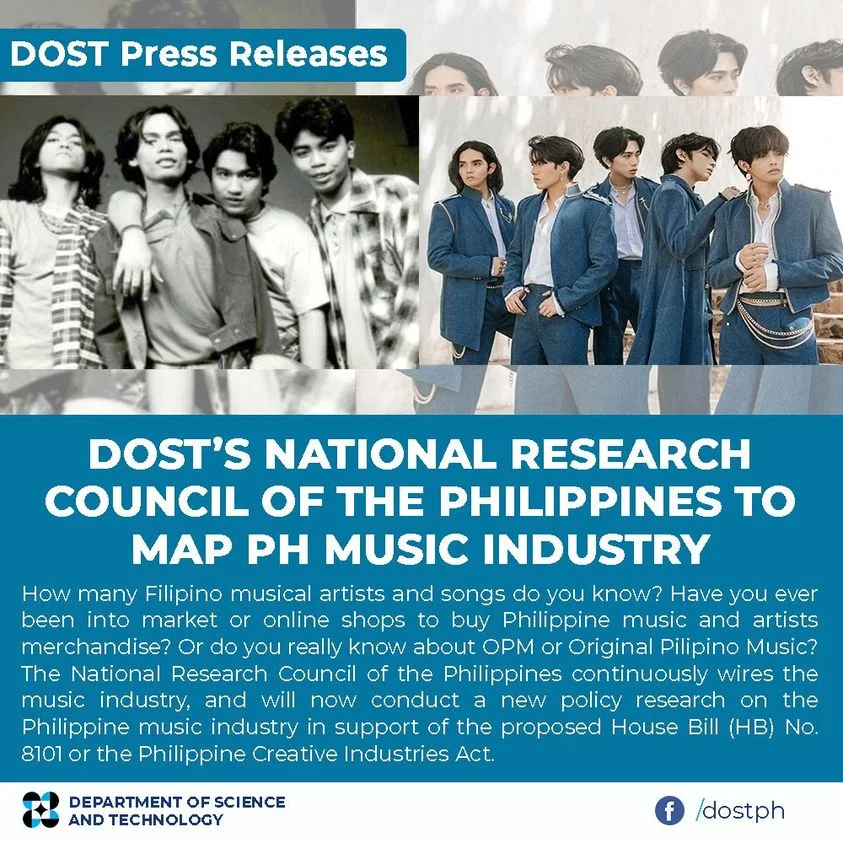DOST’s National Research Council of the Philippines to map PH music industry
How many Filipino musical artists and songs do you know? Have you ever been into market or online shops to buy Philippine music and artist’s merchandise? Or do you really know about OPM or Original Pilipino Music is?
How much really can we contribute to the economy if we patronize our own music, buy our own goods, and promote our own artists? Take that from Korean craze, the Hallyu wave, which is massively contributing to their economy.
The National Research Council of the Philippines of the Department of Science and Technology (DOST-NRCP) continuously wires the music industry, and will now conduct a new policy research on the Philippine music industry in support of the proposed House Bill (HB) No. 8101 or the Philippine Creative Industries Act.
HB 8101, filed by Pangasinan 4th District Representative, Christopher “Toff” de Venecia, pushes for the promotion, protection and improvement of the creative economy, where music and the performing arts are important sectors.
“It is high time for us to finally give the music industry, among many other sectors of our creative economy, the support and attention it deserves,” said De Venecia in one of his privilege speeches.
The DOST-NRCP new policy research study, “Musika Pilipinas: Research and Mapping Towards Understanding, Scoping, and Defining the Philippine Music Industry”, aims to provide a comprehensive baseline of the economic performance of the Philippine music industry of the country and the specific structure of its players, transactions and creative and production dynamics. It also intends to identify prospects and challenges for an effective reference on cultural policy to be utilized in the process of building a more vibrant and dynamic Philippine music industry.
Led by Dr. Ma. Alexandra I. Chua, DOST-NRCP member of the Division of Humanities, this study will produce a comprehensive mapping, scoping and defining of the Philippine music industry to provide an analysis of the country’s music market and its current state, particularly providing information and assessment of its baseline socio-cultural and economic data. This is undertaken to reveal opportunities and vulnerabilities in the country’s music ecosystem in order to suggest key areas for development for the future - including the kind of government intervention possible in support of the growth of the music industry.
The policy research also specifically aims to: (1) provide proper conceptual definition of the Philippine music industry together with the scope of its entire music ecosystem i.e., publishing, recording and live music in relation to the creation, production, distribution, consumption; (2) map out the music ecosystem and identify key players/ actors/ institutions for each of the sectors involved in the music industry (a preliminary database of key actors in the Philippine music industry will, thus, be created); (3) determine the components of the value chain of the Philippine music industry, identifying strengths and challenges in each part of the value chain in order to determine the areas that would benefit government support and private sector collaborations; (4) identify and assess market capital of music goods particularly in the pivotal transformation to digital platforms/technologies related to its production, distribution, and consumption; and (5) determine prospects of growth for the country’s music industry, both domestically and internationally.
The target beneficiaries of the project include: (1) young talented artists, music agents, promoters, managers, and producers; (2) ailing music ecosystems that need and want to be revived; (3) professional artists, managers, and producers from more mature music industry ecosystems; (4) cultural policy makers and executives; and (5) allied personnel of the music industries.
The potential outcome of the project includes the following: (1) data analysis and understanding of the economic value contributed by each part of the value chain and be able to utilize this for the strategic direction of the industry’s growth; (2) creation of the database of key players and institutions in the industry; and (3) creation of a website that will make the results of the study easily accessible to scholars, experts and practitioners.
The potential impact are as follows: (1) social well-being of Filipino music artists and other stakeholders of the music industry; (2) cultivate sense of pride for Filipino composed music; (3) creation of stable jobs for musicians, producers, and music managers; (4) better support for artists in sustaining their livelihood in music; and (5) economic growth for the country.
The research study utilizes the framework based on Cultural Institutions Studies (CIS) of musicologist Peter Tschmuck (2006) and the Network Value System proposed by Ricardo Alvarez (2017) to investigate the complex social and economic dynamics of the music ecosystem of the country. The baseline setting that will be presented will serve as the jump off point for the road mapping that will be the subject of a more holistic and comprehensive 3-year MusikaPilipinas Research Program.



No comments:
Got Something to Say? Thoughts? Additional Information?